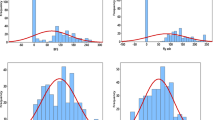Abstract
Due to the significant delay and cost associated with experimental tests, a model based evaluation of concrete compressive strength is of high value, both for the purpose of strength prediction as well as the mixture optimization. In this regard, several recent studies have employed state-of-the-art regression models in order to achieve a good prediction model, employing available experimental data sets. Nevertheless, while each of the employed models can better adapt to a specific nature of the input data, the accuracy of each individual model is limited due to the sensitivity to the choice of hyperparameters and the learning strategy. In the present work, we take a further step towards improving the accuracy of the prediction model via the weighted combination of multiple regression methods. In particular, we present a data-aided framework where the regression methods based on artificial neural network (ANN), random forest regression, and polynomial regression are jointly implemented to predict the compressive strength of concrete. The outcome of the individual regression models are then combined via a linear weighting strategy and optimized over the training data set as a quadratic convex optimization problem. It is worth mentioning that due to the convexity of the formulated problem, the globally optimum weighting strategy is obtained via standard numerical solvers. The resulting accuracy of the proposed multi-model prediction method is shown to outperform the available single-model regression methods in the literature via numerical simulations .
Access this chapter
Tax calculation will be finalised at checkout
Purchases are for personal use only
Similar content being viewed by others
References
Prayogo, D.: Metaheuristic-based machine learning system for prediction of compressive strength based on concrete mixture properties and early-age strength test results. Civil Eng. Dimension 20, 21–29 (2018). https://doi.org/10.9744/ced.20.1.21-29
Yeh, I.C.: Modeling of strength of high-performance concrete using artificial neural networks. Cem. Concr. Res. 28(12), 1797–1808 (1998)
Yeh, I.C.: Modeling concrete strength with augment-neuron networks. J. Mater. Civil Eng. 10(4), 263–268 (1998)
DeRousseau, M., Kasprzyk, J., Srubar, W., III.: Computational design optimization of concrete mixtures: a review. Cem. Concr. Res. 109, 42–53 (2018)
Sun, Y., et al.: Determination of Young’s modulus of jet grouted concretes using an intelligent model. Eng. Geol. 252, 43–53 (2019)
Sun, J., Zhang, J., Gu, Y., Huang, Y., Sun, Y., Ma, G.: Prediction of permeability and unconfined compressive strength of pervious concrete using evolved support vector regression. Constr. Build. Mater. 207, 440–449 (2019)
Zhang, J., Huang, Y., Wang, Y., Ma, G.: Multi-objective optimization of concrete mixture proportions using machine learning and metaheuristic algorithms. Constr. Build. Mater. 253, 119208 (2020)
Young, B.A., Hall, A., Pilon, L., Gupta, P., Sant, G.: Can the compressive strength of concrete be estimated from knowledge of the mixture proportions?: new insights from statistical analysis and machine learning methods. Cem. Concr. Res. 115, 379–388 (2019)
Zhang, J., Ma, G., Huang, Y., Sun, J., Aslani, F., Nener, B.: Modelling uniaxial compressive strength of lightweight self-compacting concrete using random forest regression. Constr. Build. Mater. 210, 713–719 (2019)
Asteris, P.G., Mokos, V.G.: Concrete compressive strength using artificial neural networks. Neural Comput. Appl. 32, 11807–11826 (2020)
Zhang, J., et al.: A hybrid intelligent system for designing optimal proportions of recycled aggregate concrete. J. Clean. Prod. 273, 122922 (2020)
Reich, Y.: Machine learning techniques for civil engineering problems. Comput.-Aided Civil Infrastruct. Eng. 12(4), 295–310 (1997)
Segal, M.R.: Machine learning benchmarks and random forest regression (2004)
Ibearugbulem, O.M., Ettu, L.O., Ezeh, J.C., Anya, U.C.: A new regression model for optimizing concrete mixes. Int. J. Eng. Sci. Res. Technol. 2(7), 1735–1742 (2013)
Poor, H.V.: An Introduction to Signal Detection and Estimation. Springer, New York (2013). https://doi.org/10.1007/978-1-4757-2341-0
Boyd, S., Vandenberghe, L.: Convex Optimization. Cambridge University Press, Cambridge (2004)
Goodfellow, I., et al.: Deep Learning, vol. 1, no. 2. MIT Press, Cambridge (2016)
Yann, L., Peaucelle, D., Henrion, D.: SeDuMi interface 1.02: a tool for solving LMI problems with SeDuMi. In: Proceedings. IEEE International Symposium on Computer Aided Control System Design (2002)
Bixby, B.: The Gurobi optimizer. Transp. Res. Part B 41(2), 159–178 (2007)
Author information
Authors and Affiliations
Editor information
Editors and Affiliations
Rights and permissions
Copyright information
© 2022 The Author(s), under exclusive license to Springer Nature Switzerland AG
About this paper
Cite this paper
Taghizadeh Motlagh, S.A., Naghizadehrokni, M. (2022). Predicting the Compressive Strength of a Ready-Mixed Concrete: An Extended Multi-model Regression Approach. In: Arai, K. (eds) Proceedings of the Future Technologies Conference (FTC) 2021, Volume 1. FTC 2021. Lecture Notes in Networks and Systems, vol 358. Springer, Cham. https://doi.org/10.1007/978-3-030-89906-6_55
Download citation
DOI: https://doi.org/10.1007/978-3-030-89906-6_55
Published:
Publisher Name: Springer, Cham
Print ISBN: 978-3-030-89905-9
Online ISBN: 978-3-030-89906-6
eBook Packages: Intelligent Technologies and RoboticsIntelligent Technologies and Robotics (R0)




